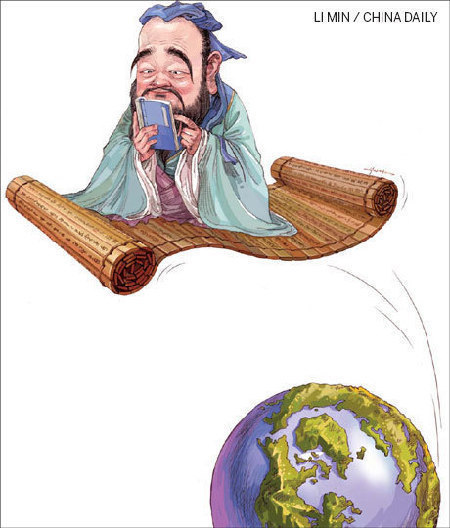
The country's publishing industry is starting to see returns from its near 10-year going global campaign, according to Yang Guang.
It's been 2,000 years since papermaking was developed in China and spread to the rest of the world through the Silk Road, and 1,000 years or so for movable type printing.
The Chinese publishing industry, however, has been engaged in an ongoing global campaign for less than a decade.
Considerable achievements have been accomplished though, especially after the initiation of the China Book International project in 2006.
Launched by the State Council Information Office and the General Administration of Press and Publication, China Book International aims to facilitate the overseas publication of Chinese books through providing funds for translation. To date, it has supported the publication of 2,156 books in 33 languages, and in 54 countries and regions.
With the 19th Beijing International Book Fair (BIBF) opening on Wednesday, Chinese publishers are braced to take advantage of this platform and take part in new exchanges with their international counterparts.
Hou Hui, director of Foreign Languages Teaching and Research Press' (FLTRP) international division, emphasizes the importance of the annual BIBF for her.
"Each year, we will make full use of the fair to exchange ideas face-to-face with our international partners and many of our co-publishing projects started this way," she says.
During this year's BIBF, FLTRP will cooperate with Germany's Springer in launching an English-language China Academic Library, a project to publish classical academic works by top Chinese scholars. The first batch of titles to emerge includes works from the sociologist and anthropologist Fei Xiaotong, historical geographer Hou Renzhi and economist Li Yining.
Since China started translating foreign literature a century ago, it has predominantly been a one-way street. But the situation has begun to change.
People's Literature Publishing House started exporting copyrights of literature after China joined the Universal Copyright Convention in the early 1990s, primarily to the Hong Kong and Taiwan regions, and some Asian countries and regions.
According to Liu Qiao, head of the publishing house's international cooperation department, for various reasons, such as the lack of competent literary translators, the exported titles were small in number and were limited to modern classics, such as Shen Congwen's Border Town and Lao She's Rickshaw Boy.
Even when deals for contemporary literature were done, the results were far from satisfactory. For instance, the advance payment for Zhang Wei's acclaimed Ancient Ship was just $1,500.
Now, however, Liu says her team is selling contemporary Chinese literature in the mainstream Western market.
For instance, since they began to represent online writer Ai Mi's romance Under the Hawthorn Tree, the unfulfilled love story set during the "cultural revolution" (1966-76) has been sold to 17 countries and regions. Its advance payment was $180,000, setting a record for literature copyright in recent years.
"Its success is attributed to its subject - a sad love story under a specific historical and social context," Liu explains, adding that such stories with a universal motif and marked Chinese characteristics are likely to arouse the interest of overseas readers. "At the same time, it has been adapted into a film of the same title by director Zhang Yimou, which adds to its international popularity."
Liu says they have realized that only through cooperating with prestigious international publishers and agents, can Chinese literary works be sold at a reasonable price; and only when the international partners have made a considerable investment, will they try their best at editing and promoting the books. And during this process, the influence of contemporary Chinese literature will be enhanced.
Statistics from the General Administration of Press and Publication indicates that by April 2012, 459 Chinese press and publishing organizations have branched out overseas, with 28 of them in book publishing-related businesses.
Registered in London in March 2007, China Youth Publishing International (CYPI) was the first Chinese publisher to invest overseas. It focuses primarily on books and relevant electronic products about Chinese culture, arts, landscape and travel.
With its unique selling point of China-themed photo albums, CYPI has gradually gained a foothold in London's publishing scene over the past five years and has established a global marketing network covering Europe, North America and Asia.
But the journey is not all smooth sailing. Guo Guang, general manager of CYPI, says the most painful lesson was when tons of books prepared for the US market had to be disposed of, because the original British spelling had not been converted.
Now, the years of pioneering toil are beginning to pay off. After three years of planning and editing, The Great Chinese Gardens: History, Concept and Techniques, which shows the visual splendors of China's finest gardens and explains their ideas and techniques in simple terms, has been published in six language editions and will be available in more than 1,000 bookstores across the world.
Guo adds CYPI is planning to establish an English-language website and start several electronic magazines to provide information and services for overseas readers.
By Yang Guang
